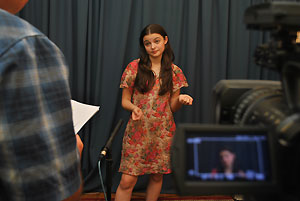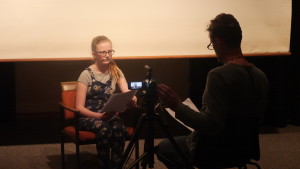 When US casting director Tom McSweeney first visited our fair Australasian shores, he was amazed that actors were expected to memorise their lines for auditions. In LA, where he came from, reading, and reading at short notice, was the norm. Tom believes that, after a cursory read-through, a good actor can pick up a scene and make good sense of it in a reading. He put this assertion to a cast of NZ Equity members attending a recent weekend workshop, and then went on to prove his point in practice. It led Jennifer Ward-Leyland, president of NZ Equity, to suggest we institute a “revolution” of reading instead of memorising for auditions in New Zealand. All of the assembled actors were vocal in agreement
When US casting director Tom McSweeney first visited our fair Australasian shores, he was amazed that actors were expected to memorise their lines for auditions. In LA, where he came from, reading, and reading at short notice, was the norm. Tom believes that, after a cursory read-through, a good actor can pick up a scene and make good sense of it in a reading. He put this assertion to a cast of NZ Equity members attending a recent weekend workshop, and then went on to prove his point in practice. It led Jennifer Ward-Leyland, president of NZ Equity, to suggest we institute a “revolution” of reading instead of memorising for auditions in New Zealand. All of the assembled actors were vocal in agreement
The last few summers I have been doing a number of tests for US pilots and in many of these I’ve been “reading” – that is, having the script in my hand. I have to say that after almost 20 years in a working environment where I learned lines for an audition, I prefer the cold-ish read. Not only have the results been satisfactory, I’ve found myself enjoying the audition more. I’m not worrying about lines – and I’m consequently more relaxed – but more unexpectedly I’ve found I hardly need to look at the script, even when I’ve only read the scene a handful of times. Just knowing you have your lines in your hand takes the pressure off and the lines tend to largely sink in on their own.
As they do it all the time American actors are rather good at the art of reading for audition, lifting the words off the page with a glance and working up a performance in short order. At any rate, the script is often out of shot and hardly detectable on film. The attitude implied by the practice is more improvisational; that the actors are there to give their take on the material, rather than a precise interpretation of it.
Perhaps our practice in Australia and New Zealand – of learning lines has evolved because on average we do less auditions and tests than an LA actor. Perhaps, because there are so many more actors in LA, their system has evolved to make the auditioning process faster and allow more actors to be seen. While learning lines is time consuming for the actor, from the casting director’s point of view it is a test, I suppose, of grace under pressure: can they keep their head, remember their lines and still deliver a result?
Against this the atmosphere on any set worth its salt is less reverent and looser about the whole lines “thingo” than in any audition room. We all know that the danger, when we hammer in lines, that we unwittingly cement in a way of saying them. This is the exact opposite of the flexibility and openness to change you want in an audition room or on set.
Yes, we have to know our lines. But in practice actors have their “sides” in their hands usually right through the initial read and blocking. This isn’t laziness, it’s because many good actors are still working out their performance at this stage. The whole scene doesn’t start to come together till the cameras roll, so it doesn’t have a chance to go stale. The knack of acting for camera, and particularly TV acting (where there are so many lines to learn), is to not learn the lines and performance too well, or be too secure. Rather, to be wholly in the moment, letting it all come together in the performance.
It seems to me that in audition the more relaxed LA style, which measures at least to some degree the improvisational quality of the actor, might be a better judge of performance for screen than our current “possum in the headlights” approach, which seems to be about testing memory as much as performance.
 I suppose casting directors in New Zealand and Australia have come to expect line fluency from actors, given we have less tests to do than American actors. But it’s not just a time factor. Countless times on DVD extras I’ve seen top US actors testing with script in hand. It’s just a style that the Americans prefer (heck, like us, it’s probably just the way they have always done it). Anyway, it’s not like actors here aren’t busy just because we don’t test three times a day. We’re still rushing from voiceovers to auditions and back to rehearsal (or home again to change nappies in my case); doing all the things we need to do to survive as actors.
I suppose casting directors in New Zealand and Australia have come to expect line fluency from actors, given we have less tests to do than American actors. But it’s not just a time factor. Countless times on DVD extras I’ve seen top US actors testing with script in hand. It’s just a style that the Americans prefer (heck, like us, it’s probably just the way they have always done it). Anyway, it’s not like actors here aren’t busy just because we don’t test three times a day. We’re still rushing from voiceovers to auditions and back to rehearsal (or home again to change nappies in my case); doing all the things we need to do to survive as actors.
If we did change the way we do things in audition rooms we’d have to accept shorter notice for auditions as part of the deal; down from the current 72 hours to 24 perhaps, with the option to be sprung a different part to read for on the day. There would be much more flexibility in the whole casting process. Casting directors could see more actors, which, with shrinking casting budgets, could only be to their advantage.
While most of us would, I suspect, relish not having to expend time on line learning, for a job we probably won’t get, some of us might dislike having less time to prepare for an audition. Actors might find cold reading a challenge at first. And of course some actors – a surprising percentage of us are dyslexic, as it turns out – will have to carry on memorizing no matter what. This aside, you’d be hard put to convince some actors that too much time to prepare – and perhaps over-prepare – is a bad thing for TV and film acting. But having spent some time as a casting director and reader I can tell you: those loose, relaxed, off the cuff takes are always the ones on the money. Ask Harry Sinclair, NZ film director of Topless Women talk about their lives, Price of Milk and Toy Love (I appeared in the latter). He made a virtue out of improvisation by handing out the day’s scenes in the make-up chair. Initially, this scared me half to death. Yet somehow, by the time it came to the first set up, you had the lines in your head. And a less affected performance too.
Given that auditions are in essence a lottery, and that most of us have to do many of them to get one job, changing the rules might bring the benefit that we can focus more on simply enjoying the experience and spend our prep time bringing our interpretative skills to the party, rather than just drilling-in lines.
What would happen if we turned up to auditions with a hard copy of the audition scenes in our hand? Anyone for a quiet revolution?
This article first appeared in the MEAA magazine in 2011